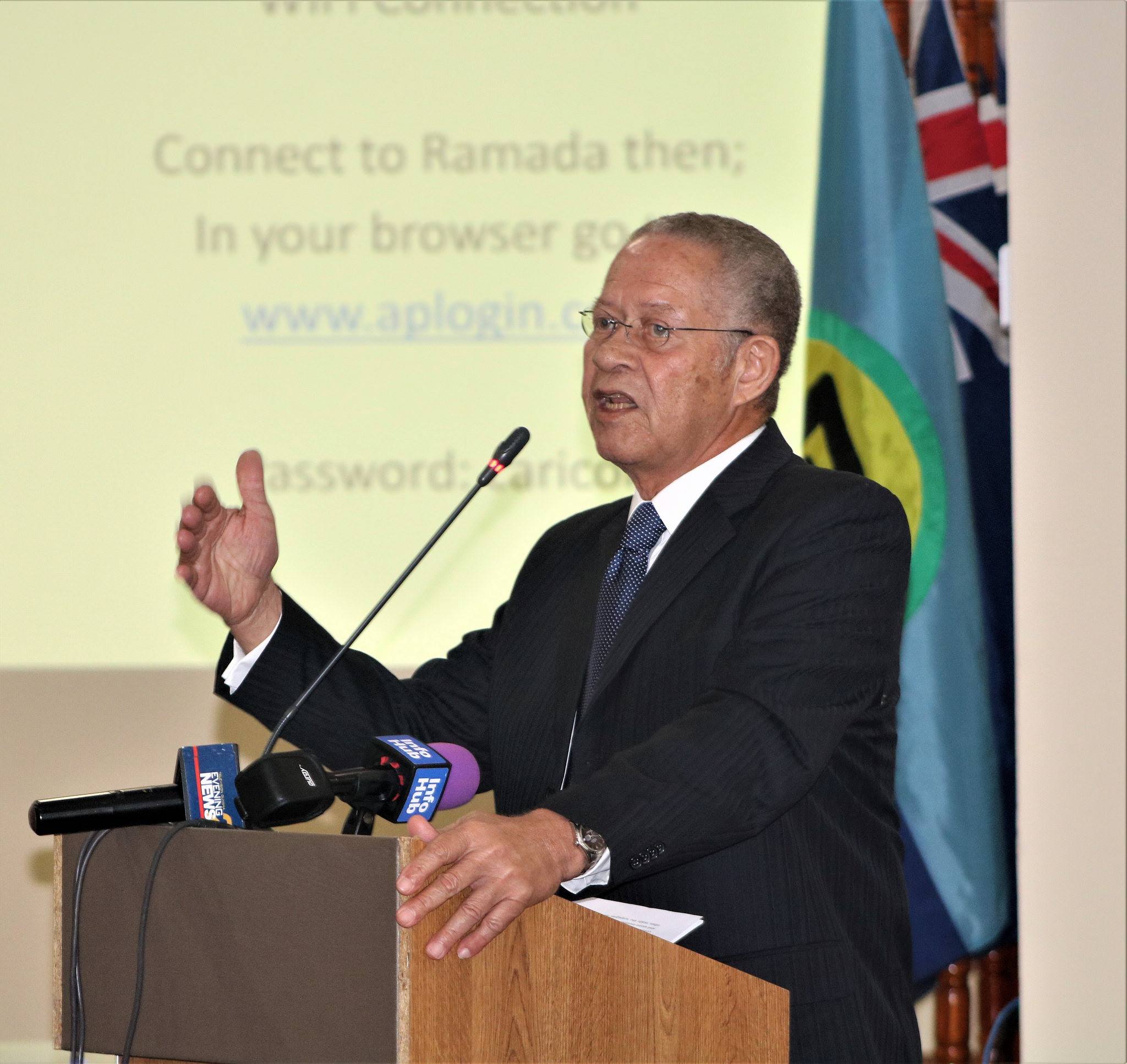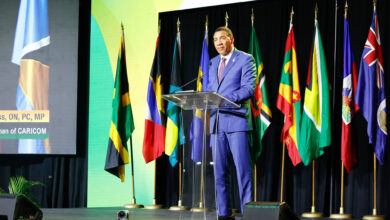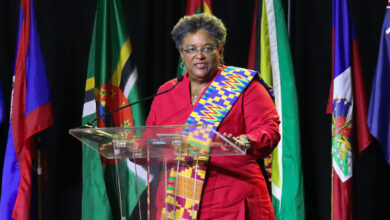It is appropriate to remind ourselves that it is now almost 30 years since the Grande Anse Declaration of 1989 in which member states committed themselves to transforming the Caribbean Community into a Single Market and Economy. The report of the most recent review of the CSME prepared by the Secretariat provides a useful frame of reference for these consultations.
We have been here before……many times before. The plethora of reports highlighting the crawling pace of implementation and the successive action plans formulated in response are sufficient to fill a four-drawer filing cabinet.
We tend to forgive ourselves by arguing that some progress has been made. Some progress has, indeed, been made in terms of putting in place some elements of the legislative and institutional framework. But, like in building a house, you can’t live in it if the roof is not yet on, you can’t feel safe in it if it has no doors and windows, you can’t function properly in it if the plumbing and electrics are not installed and you certainly won’t be comfortable in it if the furnishings are not in place. It doesn’t have to be palatial or luxurious but it must be functional. We are still far away from that stage of functionality.
I would argue that in the spectrum of transition, we are further away from the fulfillment of the Single Market and Economy than we are from the Common Market that it was intended to replace.
The report identifies the implementation issues, the progress that has been made and the several matters on which required action is stubbornly unforthcoming.
In spite of this, credit must be given to the Secretariat for the considerable efforts it has made to push the implementation process and assist member states to fulfill their obligations. The Secretariat is often made the scapegoat for CARICOM’s failures. It is unfair to the Secretary-General and his staff. I would not want his job for five times his salary; the frustration that it must certainly cause would be hazardous to my health.
Implementation is primarily the responsibility of national governments. The Secretariat dare not even appear to be inserting itself in the decision-making or implementation process of member states.
I know from private conversations that multilateral agencies that have funded some of the CSME implementation efforts are also frustrated, indeed, exasperated.
It must be acknowledged that the implementation actions required of each member state are not in all cases simple matters; some are very complex, requiring far-reaching policy changes, legislative processes and executive action. Stakeholders have to be sensitized and persuaded to buy into the process. Many of our member states, too, are constrained by capacity and resource challenges.
Yet, the list of matters that are yet to be actioned and which the report so helpfully identified on a country-by-country basis is distressing and embarrassing. Hardly any plausible excuse or explanation has been offered by any of these member states for its inaction. Indeed, hardly could any be proffered, given the length of time that has elapsed.
The report lists unimplemented decisions, agreements awaiting signatures or ratification, protocols not instituted, required legislation not enacted, administrative steps not taken – issues that, in some cases, have been languishing for more than ten years. One gets a sense that time is of no essence and compliance of no great priority. The report repeatedly points to the inability of the Secretariat to even obtain information from member states.
What is more troubling is the fact that the matters on which we have floundered for decades are less challenging than the ones to which we have not yet turned our attention. The heavy lifting, for example, macro-economic convergence, free movement of people and free circulation of goods – requirements that are central to the creation and functioning of a single economic space – are yet to be placed on the table for decisions and action.
What is the primary cause of this malaise? Capacity or resource constraints? Lethargy? I think not! Is it lack of political will? That would suggest acceptance of the merits and necessity of doing something but an absence of the courage to do it. I think not, as well.
I suggest that we need to delve deeper than the quantitative and qualitative assessment of the progress or lack thereof of the CSME implementation. It seems to me that among most – if not all – member states (including my own), there are deep misgivings about some of the CSME provisions and requirements. It seems to me that some member states are of the view that full implementation of the CSME is likely to do them more harm than good.
The dilatory approach to their work of some of CARICOM’s most critical organs and bodies – COFAP and the Legal Affairs Committee being the most notable examples – is not unrelated to the skepticism held by those from whom they take their directions.
We continue to be deceptive to each other and to the Caribbean people in repeatedly and so passionately proclaiming our commitment to the CSME as an integral part of the regional integration process while concealing the doubts and fears that prevent us from honouring that commitment.
I am indebted to Prime Minister Ralph Gonsalves who is the only head of government that has publicly commented on the contents of the report of Jamaica’s CARICOM Review Commission that I was asked to chair. His comments are instructive and have shone some light on where we are likely to be going…….or not going.
Prime Minister Gonsalves deems to be unworkable the mechanisms that were proposed to secure compliance in the absence of a supranational executive authority which, like me, he considers to be unattainable. But then he goes further to suggest that even if such an executive authority existed, it is unlikely that “a single economy can be fashioned in CARICOM now or in the foreseeable future”. He points to the current context of globalization, the condition of the regional economies and the unequal yoking of the member states. He concludes by saying that “we ought reasonably to spend our time more usefully on the attainment of the goals resident in the other pillars of CARICOM’s design”. However you parse that, it sounds like a requiem for the CSME.
I don’t share that position. Differences in size and level of economic development are not necessarily obstacles to economic integration. Bulgaria and Romania are vastly dissimilar to France and Germany but they are all part of the European Union. Singapore is light years ahead of Cambodia and Laos but they are among the countries that formed the ASEAN Economic Community that, in its ten years of existence, seems set to overtake CARICOM in its integration achievements.
Prime Minister Gonsalves is emphatic that “from the standpoint of the OECS….a Single Economy is a non-starter unless there is a special carve-out for the OECS member states”. Transitional preferential arrangements for some member states are not unusual in economic unions but they are transitional – not permanent.
He goes further. He does not see macroeconomic convergence across the region as achievable and says that the full free movement of people is most unlikely to happen. Importantly, Dr. Gonsalves envisages Caribbean integration evolving or devolving into two poles: Jamaica, Haiti, Bahamas, the Dominican Republic and Cuba in the northwest and OECS countries, Barbados, Trinidad & Tobago, Guyana and Suriname in the southeast. That scenario is not without logic, but its implications for the fulfillment of the CSME cannot be sidestepped.
Dr. Gonsalves’ views are not to be taken lightly. He is the longest serving head of government in CARICOM and his views may well have been forged by the pragmatism that comes with that longevity of tenure. In his instinctive and commendable candor, he has brought the rubber closer to the road and it is important that his forthrightness be used to initiate the frank discussion about the usefulness of the CSME that we have, for so long and so skillfully avoided.
Is the CSME overambitious? Did we bite off more than we can chew? Did we take into account all of its implications and the net effect it would have and the benefits that it would provide, not just for the region as a whole but also for every single member state? Have the circumstances that informed its conceptualization changed so dramatically as to call the very idea of a Single Market and Economy into question?
As I prepared my thoughts for this consultation, it occurred to me that in spite of the many assessments and evaluations to which the CSME project has been subjected, there seems to be a most significant omission. Dr. Gonsalves refers to a study that was carried out to assess the impact of CARICOM’s trading arrangement on his country’s manufacturing sector. I am open to correction but it does not appear to me that any country-by-country stress test was ever done to identify and measure any negative impact that the CSME, in its full rollout and across all sectors, is likely to have on individual member states. Several questions arise, among them:
· How would free movement of goods affect the LDCs, given the character of their productive base? Globalization has shown how we can be displaced on our own supermarket shelves by lower cost producers.
· How would free movement of people and service providers affect individual member states who are bedeviled by high levels of unemployment – not to mention the impact on public services. What are the social and political implications for a country like Antigua and Barbuda, a substantial portion of whose population already are immigrants from other countries?
· How would free circulation of goods affect the revenues that each country derives from border tariffs?
· How would macroeconomic convergence involving restraints on fiscal expenditure, debt accumulation, foreign exchange policy, investment incentives etc. affect the ability of individual governments to deliver on their mandates, especially with the pressures brought on by their electoral cycles?
From the very outset, it was acknowledged and stated that regional integration including the CSME is not a panacea. A country’s fortunes depend to a large extent on the domestic policy decisions and actions that it takes, its level of cohesion and inclusiveness and the extent to which it grasps and is able to exploit opportunities, especially in a highly competitive and unforgiving environment.
In most games, there are winners and losers. In the CSME game, while there is an abundance of evidence that the region as a whole will benefit, there is the danger that some will win while others could lose. We must resist the temptation to assure everyone that he will be a winner. What we must do is to ensure that if some fail to win, it will not be because of the rules of the game or the state of the field but how well they play the game. That involves the choices and even sacrifices they make in their preparation and execution and in adapting to the variable conditions of play. And the CSME would have to be designed and made ready to assist those who need to step up their game.
I believe we need to shift the conversation to these fundamental questions. I believe we will not get much further unless we confront those issues in a frank, dispassionate manner, bereft of the emotionalism that the regional integration concept evokes, bereft of the finger-pointing and blame-gaming. These deliberations must be data-driven, based on empirical assessment and must take into account the fact that the economic environment in which the CSME was conceived almost thirty years ago has changed dramatically.
In spite of those changes – in fact, more so, because of those changes – I believe that a Single Market and Economy is the way to go. I believe that it would provide the countries of the region with a better chance to contend with the ferociousness of the global market. But I also believe that the impact of the CSME in its full implementation on each member country needs to be carefully analyzed to identify the benefits, opportunities, risks and downsides. That would lead us to informed conclusions – whether to get on with it with the necessary urgency and enthusiasm or to say plainly to the Caribbean people: look, it is not going to work and, therefore, we will revert, as Dr. Gonsalves has suggested, to pursuing “the goals resident in the other pillars of CARICOM’s design”. Until and unless `we get to that point, the Secretariat will be left doing not much more than spinning wheels.
I offer a final (and, I believe important) observation. A big part of the reason why the possible impact of the CSME is so opaque and, hence, our approach so tentative is the fact that those who would be primarily involved in determining that impact and delivering the hoped-for benefits have been left in the margins of CARICOM’s deliberations and endeavours. I refer to the private sector.
The central purpose of the Single Market and Economy was to eliminate the territorial fences and create a larger space to enable the private sector – regional and external – to take advantage of the greater abundance of resources and wider opportunities for investment and job creation than exist within each of our own narrow domains.
It is primarily the private sector – not governments – that make investment decisions, create jobs, produce, import and export goods and services and manage human resources. And it is the private sector that must be looked upon to drive innovation, identify market opportunities and grow our economies. We as leaders – past and present – have often made the mistake of believing that we run things and that it is we, mostly, who make significant things happen. We are wrong.
I know that some effort has been made to engage the private sector throughout the region in the CARICOM arrangement and, more specifically, in the establishment of the CSME. These efforts have not been sufficiently forceful, strategic and purpose-driven. The Caribbean Association of Industry and Commerce is a mere shadow of what it was supposed to be. The Caribbean Business Council is a vessel that has not yet left the docks. It is too early to tell whether the more recent initiative, supported by CaribExport, to bring the region’s private sector together will yield better results. What is clear is that they need to be involved – not peripherally, not just by way of sporadic consultations, but at the centre of our policy development and decision-making process.
I was greatly and pleasantly surprised to discover, in discussions with private sector leaders in Jamaica and Trinidad & Tobago, that they have a profound appreciation of the value and possibilities of a Single Market and Economy, perhaps even more so than the politicians in the region. We may be shocked out of our wits at how much progress would be made if they are fully engaged.
The plain truth that we must now accept is that the CSME is stuck on a hill. It can’t be allowed to remain there. Tinkering will not solve that problem. We must make up our minds either to move it up or roll it back. But that decision depends on whether we believe that what lies at the top of the hill is worth climbing to reach.
Press ReleasesSpeeches
‘The CSME: A time for reckoning’ Presentation by former Prime Minister of Jamaica, Mr. Bruce Golding to the Stakeholder Consultation






